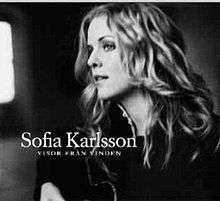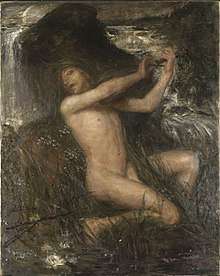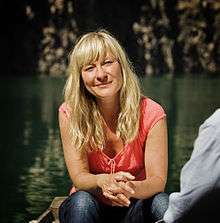Visor från vinden
Visor från vinden (Songs from the loft) is the Swedish singer Sofia Karlsson's third studio album as a solo artist. The album was released on 11 April 2007 by Bonnier Amigo Music Group.
| Visor från vinden | ||||
|---|---|---|---|---|
 | ||||
| Studio album by | ||||
| Released | 11 April 2007 | |||
| Genre | Folk music | |||
| Length | 53:54 | |||
| Language | Swedish | |||
| Label | Bonnier Amigo Music Group | |||
| Producer | Göran Petersson, Sofia Karlsson, Jan Borges | |||
| Sofia Karlsson chronology | ||||
| ||||
The album is a collection of classical songs sung in Swedish, but written by poets and musicians such as Baudelaire, Dan Andersson, Marianne Flodin, Mikael Wiehe, Alf Hambe, Inger Hagerup, Carl Michael Bellman, Peps Persson, and Evert Taube. The album also contains Lars Forssell's free version of Boris Vian's "Le Déserteur".
Visor från vinden was recorded at six different times in different places, mainly in Sweden, but also Denmark. The producers were Göran Petersson, Sofia Karlsson and Jan Borges, and among the participating musicians were Esbjörn Hazelius, Roger Tallroth and Lena Willemark.
The album reached second place on the Swedish album chart, Karlsson's best placement at that time. She received several prizes for the album: a Swedish Grammy in the folk music category in 2008, a Danish Grammy 2008 in the category "Best Foreign Album" and the Manifest Gala Prize 2008 in the folk music category.
Background
Visor från vinden followed Karlsson's 2005 hit Svarta ballader (Black Ballads) which sold 60,000 copies. Karlsson said that after Svarta ballader she had not planned to make a new album for five years. During the tour that followed the album she and her band began to incorporate more and more songs in the repertoire, so many that she finally had enough for a new album. The songs Karlsson chose to include she describes as "old favorites" that "popped up in the tour bus".[1]
Production
Recording
Visor från vinden was recorded on six different occasions. "Balladen om briggen "Blue Bird" av Hull" and "Två tungor" were recorded live at Tønder Gymnasium in Tønder, Denmark on 28 August 2006. Jan Borges was producer and Torben Laursen techniques. The songs were recorded for Radio Denmark.[2]
The second session was in September 2006, for "Milrök", at Toftaholms manor. The song was recorded by Mats Andersson.[2]
The third recording session was in December 2006 and January 2007 in Atlantis Studio, recording "Le Vin Des Amants", "Frukostrast på en liten syfabrik på landet", "Flickan och kråkan", "Spelar för livet", "Jag står här på ett torg", "Resan till Österlandet", "Märk hur vår skugga" and "Moesta e Errabunda". The songs were recorded by Janne Hansson.[2]
The fourth and fifth sessions took place in February 2007. "Näckaspel" and "Jag längtar" were recorded by Esbjörn Hazelius in Niglahol Studios and "Valsen till mig" in Studio Atlantis by Olle Linder.[2]
The sixth and last session was in March 2007, for "Hemlängtan", recorded by Olle Linder at Studio Epidemin.[2]
The iTunes release of Visor från vinden included the bonus track "Andra sidan".[3] The song was recorded live on national television in connection with a program on Karlsson. Viewers got in touch and asked where they could get hold of the song when it was released, so it was put out on iTunes.[4]
Mixing and mastering
Visor från vinden was mixed in three months in three different places: in the Atlantis studio 1 and 2 by Janne Hansson, Mikael Herrström, Pontus Olsson, Göran Peterson, Sofia Karlsson and Esbjörn Hazelius, in Fantasifoster Studios by Olle Linder and in CPR Recording by Claes Persson. Persson also mastered the album there.[2]
Tracks

"Le Vin Des Amants" was a poem by Charles Baudelaire. Dan Andersson translated it into Swedish, giving it the title "De älskandes vin", and this was the text that Karlsson used for the record. Sofie Livebrant set the poem to music, and Karlsson and Hazelius arranged it. Hazelius also plays guitar while Karlsson sings.[5]
"Milrök" is the disc's second track, and the second Dan Andersson interpretation. The music was written by Sofie Livebrant. The arrangement was by Karlsson, Hazelius and Olle Linder. The music is performed by Karlsson (vocals), Hazelius (cittern), Olle Linder (bass) and Roger Tallroth (guitar).[5]
"Frukostrast på en liten syfabrik på landet" was a poem by Marianne Flodin, written in the 1950s. Visor från vinden was set to music by Livebrant: she and Karlsson arranged the song. Livebrant also plays piano, and Karlsson sings.[5]
"Flickan och kråkan" (The girl and the crow) was written by Mikael Wiehe and was first released on the 1981 studio album Kråksånger.[6] On Visor från vinden it is performed by Karlsson (vocals, Hammond organ), Sara Isaksson and Tallroth. Tallroth and Karlsson arranged the song.[5] "Flickan och kråkan" was described by Karlsson in 2007 as a sad, but fantastic story that she had not sung since she was a teenager.[1]

"Näckaspel" (Nixie game) is a song by Alf Hambe, which he first released on his 1966 album Vägvisor och vågspel. Here it is performed by Karlsson (vocals, harmonium) and Hazelius (guitar, fiddle, octave fiddle). It was arranged by Karlsson and Hazelius.[5]
"Spelar för livet" is a song by Peps Persson, originally released as "För livet" on his studio album Spelar för livet (1992). In Karlsson's version it is performed by Karlsson (vocals, whistle), Hazelius (cittern, violin, vocals), Tallroth (tenor guitar, vocals), Linder (contrabass, percussion, vocals). All four of them arranged the song.[5]
"Jag längtar" was originally a traditional Norwegian song. Here it is performed with music by Karlsson. The Swedish text was written by Karlsson and Esmeralda Moberg. The song was arranged by Karlsson and Hazelius. Karlsson sang and Hazelius played the guitar and violin.[5]
"Balladen om briggen 'Blue Bird' av Hull" was a song by Evert Taube, first published in the 1929 Fritiof Anderssons visbok. Here it is arranged by Karlsson, Hazelius, Tallroth and Linder, and performed by Karlsson (vocals), Hazelius (cittern), Tallroth (tenor guitar) and Linder (bass).[5] Karlsson was for a long time undecided about using "Balladen om briggen "Blue Bird" av Hull" on the disc as she wasn't sure people wanted to hear it, but "then she decided to use it anyway."[1]
"Två tungor" was a poem by the Norwegian poet Inger Hagerup. The singer Fred Åkerström translated it into Swedish, and the Norwegian singer Finn Kalvik set it to music. In this version it was first heard on Åkerström's 1972 album Två tungor. Here it is arranged by Karlsson och Hazelius, and performed by Karlsson (vocals, bouzouki, guitar), Hazelius (cittern), Tallroth (tenor guitar) and Linder (bass).[5]

"Jag står här på ett torg" is a famous antiwar song by the French novelist, poet and musician Boris Vian, originally published in 1954 under the French title "Le Déserteur". Lars Forssell translated the song into Swedish. The song was arranged by Karlsson and Livebrant and performed by Karlsson (vocals), Livebrant (piano), Nils Berg (bass clarinet) and Linder (bass).[5]

"Hemlängtan" was originally a poem by Dan Andersson, set to music by Gunnar Turesson. Here it is arranged by Karlsson, Hazelius and Linder and performed by Karlsson (vocals), Hazelius (cittern, vocals), Lisa Rydberg (violin), Henrik Cederblom (dobro) and Linder (percussion, vocals).[5]
"Resan till Österlandet" is a traditional song, with verse 2 added by Karlsson. It was arranged by Karlsson and performed a cappella by her, Isaksson and Will Mark (vocals).[5]
"Valsen till mig" is the disc's only instrumental track, written by Hazelius, and performed by Hazelius (violin, cittern), Karlsson (transverse flute), Tallroth (guitar) and Linder (bass, percussion). It was arranged by the quartet.[5]

"Märk hur vår skugga" (Fredmans epistel no 81) the disc's only Carl Michael Bellman interpretation, first published in Fredman's Epistles in 1790. The Songs from the wind driven by the Karlsson (vocals), Hazelius (bouzouki, guitar); Cederblom (dobro) and Linder (bass). It was arranged by Karlsson and Hazelius.[5]
"Moesta et Errabunda" is a poem by Baudelaire, originally published in his 1857 poetry collection Les Fleurs du mal ("The Flowers of Evil").[7] It was translated by Dan Andersson, set to music by Livebrant and performed by Livebrant (piano), Karlsson (vocals), Hazelius (viola, violin) and Peter Lysell (bass).[5]
Track list
- "Le Vin Des Amants" – 3:44 (musik: Sofie Livebrant, text: Charles Baudelaire, trans. Dan Andersson)
- "Milrök" – 2:39 (text: Dan Andersson, music: Sofie Livebrant)
- "Frukostrast på en liten syfabrik på landet" ("Breakfast Break in a small sewing factory in the country") – 3:44 (text: Marianne Flodin, music: Sofie Livebrant)
- "Flickan och kråkan" (The girl and the crow) – 3:15 (Mikael Wiehe)
- "Näckaspel" – (Nixie play) 2:59 (Alf Hambe)
- "Spelar för livet" (Playing for life) – 3:12 (Peps Persson)
- "Jag längtar" (I'm longing) – 2:03 (music: Sofia Karlsson, text: trans. Sofia Karlsson, Esmeralda Moberg)
- "Balladen om briggen 'Blue Bird' av Hull" (The ballad of the brig 'Blue Bird' from Hull) – 5:19 (Evert Taube)
- "Två tungor" (Two tongues) – 2:33 (music: Finn Kalvik, text: Inger Hagerup, Fred Åkerström)
- "Jag står här på ett torg" (I'm standing in the square) – 5:00 (text and music: Boris Vian, Hal Berg, trans. Lars Forssell)
- "Hemlängtan" (Homesickness) – 3:43 (music: Gunnar Turesson, text: Dan Andersson)
- "Resan till Österlandet" (Journey to the East) – 2:49 (musik: trad., trans. Sofia Karlsson)
- "Valsen till mig" (Waltz me) – 2:44 (Esbjörn Hazelius)
- "Märk hur vår skugga" (Mark how our shadow: Fredmans epistel no 81) – 4:51 (Carl Michael Bellman)
- "Moesta et Errabunda" (Sad and wandering) – 4:42 (music: Sofie Livebrant, text: Charles Baudelaire, trans. Dan Andersson)
- "Andra sidan" (The other side) (bonus track, live) – 2:43
Participants

Musicians
- Nils Berg – bass clarinet
- Henrik Cederblom – dobro
- Esbjörn Hazelius – cittern, violin, viola, guitar, bouzuki, voice
- Sara Isaksson – voice, Wurlitzer
- Sofia Karlsson – voice, Hammond B3, harmonium, flute, piccolo, bouzouki
- Olle Linder – contrabass, percussion, voice
- Sofie Livebrant – piano
- Peter Lysell – contrabass
- Lisa Rydberg – violin
- Roger Tallroth – tenor guitar, guitar, voice
- Lena Willemark – voice
Reception
Visor från vinden had a mixed reception and a score of 3.4/5 on Kritiker.se, based on fifteen reviews. The album generally received threes and fours in the ratings.[8]
Among the more negative reviewers was Aftonbladet's Jonna Sima. She called Charles's music "traditional" and "stylish" but "dull in comparison with song interpreters like Cornelis Vreeswijk."[9]
Dagens Industri's Jan Gradvall gave it 4/5. In his review he wrote: "After two years of constant touring, Sofia Karlsson on the sequel Visor från vinden honed her artistry to perfection. In the 1960s it was Fred Åkerström and Cornelis Vreeswijk who renewed Swedish song. In the 1980s, it was the Empire with the double-sided single, Bellman's "Mark how our shadow" and Taube's "Ballad of the brig Blue Bird of Hull." in the 2000s, it was Sofia Karlsson."[10]
Expressen gave it 3/5. The reviewer Anders Dahlbom "After the unexpected huge success of the 2005 "Svarta Ballader", this album feels like a logical sequel. Karlsson puts new life into material from Dan Andersson, Wiehe, Peps and Taube among others. And although some track selections feels rather predictable Karlsson's detailed traditional folk sounds strangely timeless. Its success is likely to continue, both on the sales lists and tours."[11]
Norran gave the disc 4/5. The reviewer Olle Lundqvist wrote: "She is one of the new milliennium's musical exclamation marks, and excitement about Sofia Karlsson is not likely to die down with this album." A little later in the review, he continued: "The interpretations are straight, yet personal. The voice also. There is nothing ingratiating, but plenty of individuality and integrity. This is song with style and soul."[12]
Sundsvalls Tidning awarded 4/5. The reviewer Per-Roger Carlsson wrote: "Now she offers more variation, but Sofia lives on her expression and is firmly rooted in song. No experiment and improvisation, but with song tradition as her fixed point." The review ended with "Fine vocal art from a great vocal artist."[13]
Svenska Dagbladet's review gave the disc 4/6. The reviewer Ingrid Strömdahl wrote: "Two poems by Baudelaire in Dan Andersson's interpretation and Sofie Livebrant's musical setting. Taube's heart-stopping ballad about the brig Bluebird and Bellman's "Mark how our shadow", earlier recorded by Joakim Thåström. Wiehe's "The girl and the crow", Alf Hambe, Peps, and more... a diverse collection of songs that Sofia Karlsson sings sensitively and with lovely ornamentation to the varied orchestration."[14]
Östgöta Correspondenten rated it 4/5 and wrote "Of course, the music is absolutely perfect, but the piano and the wind instruments are unbalanced so that it is not only beautiful, but a little bit bitter, too."[15]
Scores awarded by other newspapers include Borås Tidning (1/5), Dagens skiva (7/10), Dalademokraten (3/5), Göteborgsposten (4/5), Helsingborgs Dagblad (3/5), Kristianstadsbladet (3/5), Nerikes Allehanda (4/5) och Upsala Nya Tidning (4/5).[8]
Awards and distinctions
Visor från vinden has won several prizes. It won a Swedish Grammy in the category "folk music/song" in 2008. In the Manifestgala the same year, Visor från vinden won the prize in the category "Folk music/song". The jury commented: "For song so intensely present that everything seems born of the moment and with a musicality at the same time rooted in folk music tradition and timelessly modern."[16]
In March 2008, Karlsson received the Danish Music Award in the category "Best foreign albums" for Visor från vinden. The prize is an offshoot of the Danish Grammy gala.[17]
Charts
Visor från vinden reached second on the Swedish album chart, which was at that time Karlsson's best list placement. The album stayed in the chart for 37 weeks (April 2007-March 2008).[18]
| Chart (2007–2008) | Peak position |
|---|---|
| Sweden[18] | 2 |
References
- "Visfavoriter från turnén". Dagens Nyheter. 12 April 2007. Retrieved 13 May 2012.
- "Visor från vinden". Sofia Karlsson. Archived from the original on 28 April 2013. Retrieved 13 May 2012.
- "Visor från vinden". Itunes. Retrieved 13 May 2012.
- "Andra sidan". Myspace. Retrieved 13 May 2012.
- "Visor från vinden". Sonloco.com. Retrieved 13 May 2012.
- "Svensk mediedatabas". Retrieved 13 May 2012.
- Baudelaire, Charles. "Moesta et errabunda". Fleursdumal.org. Retrieved 5 March 2016. French original, with multiple English versions.
- "Visor från vinden". Kritiker.se. Retrieved 13 May 2012.
- Sima, Jonna (18 April 2007). "Visor från vinden". Aftonbladet. Retrieved 13 May 2012.
- Gradvall, Jan. "Visor från vinden". Dagens Industri. Retrieved 13 May 2012.
- Dahlbom, Anders (10 April 2007). "Visor från vinden". Expressen. Retrieved 13 May 2012.
- Lundqvist, Olle (11 April 2007). "Visor från vinden". Norran. Archived from the original on 16 July 2012. Retrieved 13 May 2012.
- Carlsson, Per-Roger (28 April 2007). "Visor från vinden". Sundsvalls Tidning. Retrieved 13 May 2012.
- Strömdahl, Ingrid (11 April 2007). "Visor från vinden". Svenska Dagbladet. Retrieved 13 May 2012.
- "Vackert men en aning beskt". Östgöta Correspondenten. 11 April 2007. Retrieved 13 May 2012.
- "Manifestgalan 2008". Manifestgalan. Retrieved 13 May 2012.
- Eriksson, Karoline (11 March 2008). "Sofia Karlsson vann dansk grammis". Svenska Dagbladet. Retrieved 13 May 2012.
- Placeringar på den svenska albumlistan